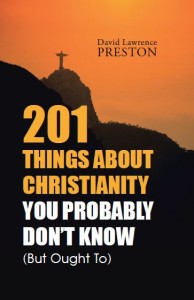Church theologians say that everything we need to know about Yeshua (‘Jesus’) can be found in the New Testament, and that what is written there is all true. But surely if we want a rounded picture, we must be look at all available sources. That’s not easy; Yeshua barely features in any non-Christian sources from the 1st Century and none at all from the first half of the century when he was alive.
Outside the New Testament there are only four known references to him, and they don’t say very much:
- Flavius Josephus[1], a Jewish historian (c37-c100 CE), referred to him as a ‘Yeshua who was called Christ’, a healer from Galilee[2] who attracted large crowds, told stories and was put to death because he made the authorities nervous.
- The Roman historian Tacitus (c55-c120 CE) wrote of the ‘Chrestiani’ blamed by the Emperor Nero for setting fire to Rome in 64 CE. The name derived from ‘Christus’ who ‘was executed in the reign of Tiberius on the orders of the procurator Pontius Pilate’ for allegedly refusing to pay taxes to the Emperor.’[3] Tacitus tells us that ten years after Yeshua’s death the authorities were aware of conflict in Rome’s Jewish community about whether Yeshua had really been their Messiah. Christians were mistrusted by mainstream Jews, persecuted by Emperor Nero and widely mocked.
- Gaius Suetonius Tranquillus (c75-150 CE), a Roman biographer and historian[4], and Pliny the Younger (c62-113 CE)[5] also mention conflicts between Yeshua’s followers and the authorities.
Neither Josephus, Tacitus, Tranquillus nor Pliny considered Yeshua’s teachings worth a mention, and none verify the most extraordinary events described in the New Testament, the virgin birth, nature miracles, resurrection and ascension.
Historians have long expressed amazement that a man who was supposedly mobbed by crowds, performed miracles and rose from the dead didn’t get much of a mention in any of the non-devotional literature of the time. It suggests he was a fairly minor figure during his lifetime, almost unknown outside his own region, and that much of what was written about him came from the creative imagination of a tiny group of people – the Christian community.
[1] Antt.20, 197-203 = XX, 9,1)
[2] A small province that is now part of Northern Israel.
[3] Annals XV, 44,3)
[4] Claudius, 25
[5] Epistles X, 96
©David Lawrence Preston, 2015
Follow me on Facebook and Twitter @David_L_Preston
Balboa Press, 2015


Leave a Reply